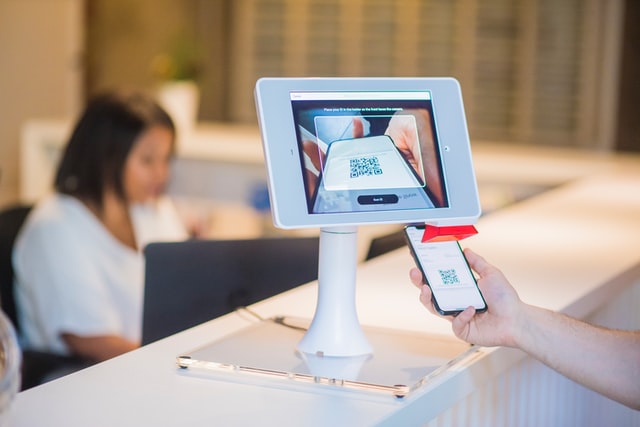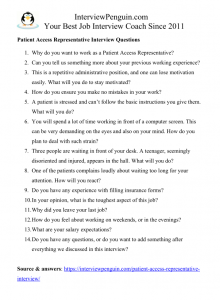Visiting a hospital or a clinic is not an easy experience for anyone. Most patients do not know where to go, what to do. They have their worries, concerns, and questions. Working as a Patient Access Representative you’ll help them check in, fill the necessary forms, and most importantly you’ll help them calm down and find their way around the building.
You do not need higher education, or any special experience, to apply for this job. Training will be provided to each new hire. Hiring managers will test your communication and administrative skills with their questions, as well as your attitude to various situations that may happen in this job on a daily basis. Let’s have a look at some questions you may face.
Table of Contents
Why do you want to work as a Patient Access Representative?
They should not get an impression that you consider this just another boring administrative job, which happens to pay slightly more than other administrative positions. Try to talk with enthusiasm about your choice.
For example, you can say that you feel a calling to help, to participate in healthcare, but wasn’t lucky enough to earn a degree in Medicine or similar field. This job is your way to participate–because each healthcare facility is like a living organism and every staff member plays their role in the success and quality of services provided to patients–including patient access reps. Seeing it this way, you find a meaningful purpose in your new occupation.
Another option is referring to your skills and experience. We enjoy doing things we do well. Maybe you have experience with a job of a receptionist, or medical assistant, or anything similar. You learned how to fill insurance form and patient check-ins, you enjoyed the process, and would like to continue working in the field. Instead of starting from scratch somewhere, you will benefit from your experience.
Can you tell us something more about your previous working experience?
Try to talk mostly about relevant things. Anything you did with people or papers–be it a job of a customer service assistant, sales representative, receptionist, data entry clerk, office assistant–is highly relevant for the job. You should avoid negative remarks about your former colleagues or bosses, because nobody wants to hire an employee who complains about everything.
Lack of experience isn’t a showstopper in this case. Ensure the interviewers that you read the job description carefully and know the expectations. Say that you are confident you’ll handle the job, after initial training. It is important to show confidence in your skills.
This is a repetitive administrative position, and one can lose motivation easily. What will you do to stay motivated?
You have a few options at this point. One is referring to the meaningful purpose of your job, and perhaps also to some goals you have outside of work.
The job may be repetitive, but you know why you wake up to work each morning. And you also realize that for the patients everything is new and nothing repetitive, and new things and situations induce anxiety, and it’s your role to help them calm down and to successfully check in.
Plus you have your goals–provide for your family, move into a nicer house, etc. You need a job to be able to attain your goals, and you will keep this on your mind when struggling with motivation.
Another alternative is saying that you actually prefer repetitive and administrative jobs. You like your routine, and do not seek extreme challenges, either in your work or in your personal life. You take care of your duties, with smile and commitment, and once the shift is over you can leave the workplace with a clear mind…
How do you ensure you make no mistakes in your work?
Mistakes can prove costly in this job. And sometimes you’ll work under pressure, for example when a long queue of patients forms in front of your desk, people are nervous, and you want to do the paperwork as quickly as possible. One can easily make a mistake in such circumstances.
Tell the interviewers that you have an ability to maintain a strong focus and attention to detail in work. Limiting all distractions and focusing only on the task at hand, you minimize the possibility of making a mistake. You will follow your routines precisely, step by step, regardless of whether two or ten people wait for your attention in a queue.
You can also say that you’ll quickly proofread every paper, and double check the most important information with the patient. At the end of the day, you can make a mistake–just like everyone else. But you try your best to minimize the possibility of making one, and will also learn from each mistake.
A patient is stressed and can’t follow the basic instructions you give them. What will you do?
The most important thing is to show the right attitude to work. You realize that admission to hospital or clinic is a stressful procedure for most people. Having empathy with their feelings, you definitely won’t be rude with your patients. On the contrary, you’ll calmly repeat the instructions, several times, or you’ll even help them with the papers if they can’t figure things out on their own.
You won’t rush things with the patients. Explaining everything clearly, and talking in a calm and cheerful voice, you will try your best to help them overcome anxiety and successfully check in. What’s more, you do not mind stepping out of the comfort zone of your desk, and walking with the patient to the right hall or right door, if they are disoriented and cannot find their way on their own.
You will spend a lot of time working in front of a computer screen. This can be very demanding on the eyes and also on your mind. How do you plan to deal with such strain?
Again you have a few options for a good answer. One is saying that you plan to minimize your screen time outside of work. You won’t head straight to the couch back home, turning on the TV and swiping Instagram while watching some series.
You’ll do relaxing activities, spending time outside, or playing with your children (if you have any), or cooking, etc. Relaxing your eyes and mind when home, you should handle the long hours in front of the computer screen while working.
Another alternative is saying that you are accustomed to long hours in front of a computer screen. Perhaps you had the same experience in your last job, or at school. You have never found it hard and see no reason why it should change in this job. Of course, whenever possible (when no patients are waiting in front of your desk), you try to relax your eyes for a bit, not looking at the screen in front of you.
* Special Tip: Download the full list of questions in a one page long PDF, and practice your interview answers anytime later:
Three people are waiting in front of your desk. A teenager, seemingly disoriented and injured, appears in the hall. What will you do?
Prioritizing the order of care will be one of your duties. If you spot someone who shows signs of possible internal bleeding or other risky injury, you should ask other patients to wait and check-in the patient in a precarious condition immediately.
Say that you will politely ask people in the queue to wait, and will walk to fetch the disoriented teenager. With a few targeted questions (what happened to them, whether they know where they are, etc) you will quickly assess the situation and possibly prioritize them, checking them in without any delays.
Ensure the hiring managers that you want to keep your eyes open in the job. Anytime spotting someone with a serious problem or huge pain, you’ll prioritize them in the queue.
Other questions you may face in your patient access representative job interview
- One of the patients complains loudly about waiting too long for your attention. How will you react?
- Do you have any experience with filling insurance forms?
- In your opinion, what is the toughest aspect of this job?
- Why did you leave your last job?
- How do you feel about working on weekends, or in the evenings?
- What are your salary expectations?
- Do you have any questions, or do you want to add something after everything we discussed in this interview?
Conclusion, next steps
Interview for a job of a Patient Access Representative belongs to easier job interviews. This is no fancy job title, and you may be the only job applicants in the room. It obviously makes your situation much easier.
On the other hand, hiring managers will typically ask you at least a couple of scenario-based (situational) questions, and you will have to demonstrate right attitude to work and to patients with your answers.
Read this article once again, and try to write down a short answer to each question. Once done, I suggest you to continue your interview preparation with the following posts:
- How to overcome interview nerves – 4 strategies for handling anxiety. One of them will surely work for you.
- Hospital volunteer interview questions.
- Health Unit Coordinator interview questions.


